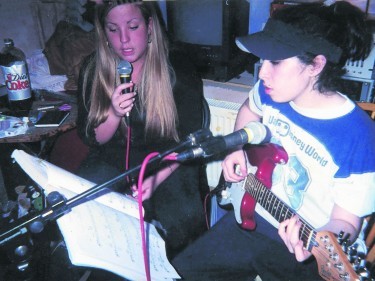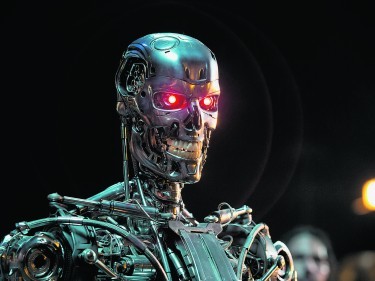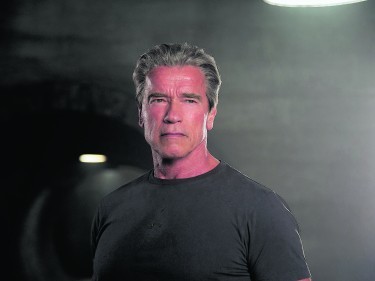AMY (15)
5 stars
With her distinctive beehive hairdo, thick eyeliner and deep, soulful vocal delivery, Amy Winehouse became a defiantly outspoken icon for a generation.
Born and raised in Southgate, north London, she drew inspiration from the music of Dinah Washington, Sarah Vaughan and Tony Bennett, and exorcised personal demons through her songwriting, encapsulating experiences of heartache, abandonment and despair in her emotionally raw lyrics.
“My destructive side has grown a mile wide, and I question myself again,” she laments prophetically in the song What Is It About Men on her debut album, Frank.
Scarred by the separation of her parents, Winehouse concealed an eating disorder from those closest to her and repeatedly sought personal oblivion in a heady cocktail of alcohol and drugs.
Her death in July 2011, at the same age as Jimi Hendrix, Janis Joplin, Jim Morrison and Kurt Cobain, sparked a period of national soul-searching.
Asif Kapadia’s deeply moving documentary charts the turbulent life of the songbird, including contributions from many of her friends and family, and some of the people who worked with her and were touched by her fragility and candour.
Unfolding largely in chronological order, Amy begins with home-video footage of a good friend’s 14th birthday and meticulously charts her rise to celebrity, incorporating performances, interviews, rare photographs and reminiscences of the people who knew her well.
“If I really thought I was famous, I’d top myself,” Winehouse tells one journalist early in the film, her words casting a shadow over subsequent scenes of triumph as Frank leaves critics reaching for superlatives and she storms America with the follow-up, Back To Black, earning five Grammy awards including Record of the Year and Song of the Year.
The film doesn’t pull punches with its depiction of her battles with drug and alcohol addiction, posing difficult questions about the culpability of the media and some of her inner circle in her tragic downfall.
Through Kapadia’s lens, her father, Mitchell, shoulders some of that blame, first by advising Winehouse not to go into rehab – “I felt that’s Amy’s responsibility to get herself well,” he offers by way of an explanation – and then by gatecrashing her recuperation on St Lucia with a reality TV crew in tow to bolster his media profile.
Her husband, Blake Fielder-Civil, is depicted as a similarly destructive influence, including footage of them together in the flat when she first tries crack cocaine.
“I tried to sabotage myself and she tried to sabotage herself. Maybe that was our natures,” he confesses.
Relationships with Alex Clare and Reg Traviss, which book-ended her rollercoaster marriage, warrant only brief mentions, but Kapadia would need considerably longer than 127 minutes to delve into every personal tie.
As it is, his elegantly composed memento mori leaves us with a deep sense of sadness and anger as we watch the singer totter towards oblivion, seemingly with no one to shepherd her away from the edge.
TERMINATOR GENISYS (12A)
2 stars
In Terminator Genisys, the misfiring reboot of James Cameron’s apocalyptic time-travelling saga, Arnold Schwarzenegger’s cyborg assassin repeatedly references his advancing years in a dystopian world of young pretenders.
“I’m old, not obsolete,” he deadpans in that distinctive Teutonic growl.
Alas, the hulking Austrian action man and the blockbusting franchise are both ready for the scrapheap.
Millions of dollars of special effects, some of them workmanlike, cannot disguise the fried circuitry of Laeta Kalogridis and Patrick Lussier’s script, which is hardwired with the muddled concept of alternate universes to explain the tweaks to this re-imagined origin story.
Released in 1984, The Terminator tapped into timely concerns about nuclear warfare to explore a bleak future in which machines have rebelled against mankind and rendered our species almost obsolete.
Terminator Genisys follows a similarly gloomy trajectory.
In the aftermath of judgment day, the last vestiges of mankind face complete extinction at the hands of the automata.
Rebel leader John Connor (Jason Clarke) leads the charge in 2029 Los Angeles, flanked by best friend Kyle Reese (Jai Courtney).
“You gave us all a future, John. I’m going to use mine,” declares Kyle, who volunteers to venture back to 1984 to protect John’s mother, Sarah (Emilia Clarke), from a shape-shifting T-1000 (Byung-hun Lee).
When Kyle arrives, he discovers that he has gatecrashed an altered timeline in which the Connor matriarch is a ballsy warrior, who already has a protector: an ageing T-800 (Schwarzenegger), which she refers to affectionately as “pops”.
Sarah, Kyle and the T-800 launch an assault on Cyberdyne Systems, run by Miles Dyson (Courtney B. Vance) and his son, Danny (Dayo Okeniyi), who will unwittingly give birth to Skynet and bring about mankind’s downfall.
However, someone knows they are coming.
Terminator Genisys attempts to mimic Jurassic World by exploiting our nostalgia, but Alan Taylor’s picture has neither the jaw-dropping thrills nor the wry humour of the rampaging dinosaurs.
The multiple timelines become a tangled, knotty mess before the
two hours are up, making us wish that Skynet had, in an alternate universe, infected the scriptwriters’ computers with a deadly virus
and wiped this film from their hard drives.
Action sequences feel secondhand: duels between different model Terminators were choreographed with more flair in previous films and the culmination to a chase across the Golden Gate Bridge whiffs of The Lost World: Jurassic Park.
Faltering comic relief arrives in the form of J.K. Simmons’s veteran LAPD detective, who is rescued by Sarah and Kyle in 1984, and drives his colleagues mad with far-fetched stories of killer robots.
“We’re here to stop the end of the world,” Sarah tells him.
“I can work with that,” grins the detective.
Unfortunately, we can’t work with Taylor’s reboot.
The end – including an additional scene secreted in the credits – can’t come soon enough.



